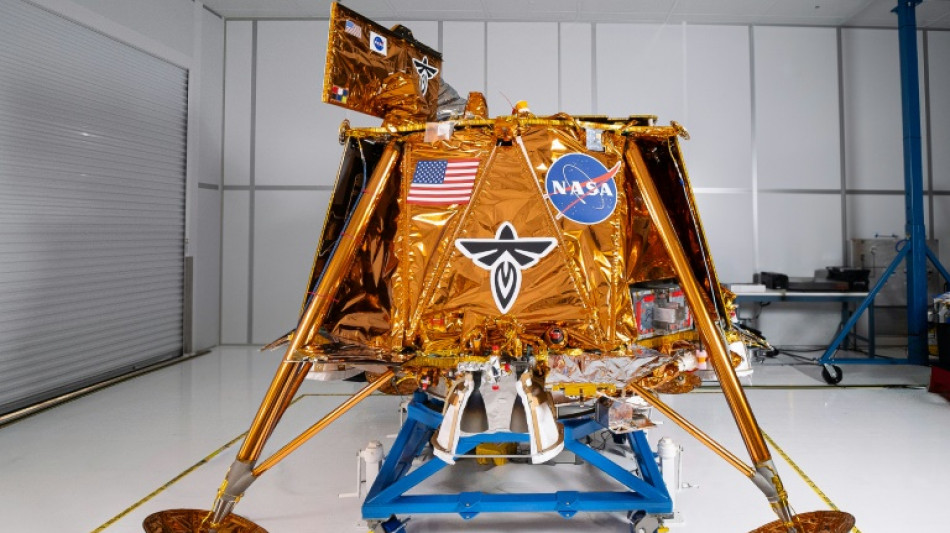
-
 Spain hosted record 94 mn foreign tourists in 2024
Spain hosted record 94 mn foreign tourists in 2024
-
European stocks climb as inflation takes centre stage

-
 BP nears deals for oil fields, curbs on gas flaring in Iraq
BP nears deals for oil fields, curbs on gas flaring in Iraq
-
Mozambique inaugurates new president after deadly post-election unrest

-
 Syrian activists work to avoid return to dictatorship
Syrian activists work to avoid return to dictatorship
-
Beijing 'firmly opposes' US ban on smart cars with Chinese tech

-
 Equities mixed as US inflation, China data loom
Equities mixed as US inflation, China data loom
-
UK inflation dips, easing some pressure on government

-
 German bourse banks on Trump-fuelled crypto boom
German bourse banks on Trump-fuelled crypto boom
-
Record 36.8 million tourists visited Japan in 2024

-
 German far-right AfD takes aim at Bauhaus movement
German far-right AfD takes aim at Bauhaus movement
-
SpaceX set for seventh test of Starship megarocket
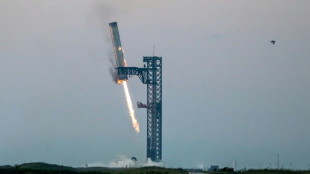
-
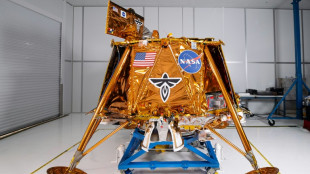 Private US, Japanese lunar landers launch on single rocket
Private US, Japanese lunar landers launch on single rocket
-
Spanish youth ditch dating apps for 'real life' love

-
 Bangladesh's Yunus demands return of stolen billions
Bangladesh's Yunus demands return of stolen billions
-
Asian equities mixed as US inflation, China data loom

-
 Renewed US trade war threatens China's 'lifeline'
Renewed US trade war threatens China's 'lifeline'
-
China's economy seen slowing further in 2024: AFP survey

-
 Musk, Bezos, Zuckerberg to attend Trump inauguration: report
Musk, Bezos, Zuckerberg to attend Trump inauguration: report
-
'We may look easy-going, but...' Canadians veto Trump's merger plan

-
 Starbucks shift on non-paying visitors stirs debate in US
Starbucks shift on non-paying visitors stirs debate in US
-
US, Japanese lunar landers set to launch on single rocket
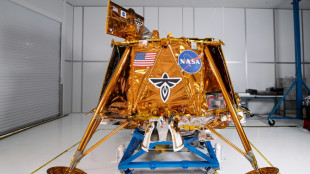
-
 Boeing 2024 plane deliveries tumble on labor, safety woes
Boeing 2024 plane deliveries tumble on labor, safety woes
-
Argentine annual inflation nosedives, in boost for Milei

-
 Meta to lay off 3,600 employees in performance-based cuts
Meta to lay off 3,600 employees in performance-based cuts
-
Mexico hails $5 bn Amazon investment in face of Trump threats

-
 MSNBC boss leaves ahead of Trump White House return
MSNBC boss leaves ahead of Trump White House return
-
Panama Canal will 'remain' Panamanian: UN maritime chief

-
 Amazon orders 200 Mercedes-Benz electric trucks
Amazon orders 200 Mercedes-Benz electric trucks
-
Amazon to invest over $5 bn in Mexico data center

-
 Lindt chocolate to raise prices again this year
Lindt chocolate to raise prices again this year
-
UK finance minister, hit by market woes, stands firm on growth

-
 Dozens rescued, 15 bodies pulled from South Africa mine
Dozens rescued, 15 bodies pulled from South Africa mine
-
Ukraine hits Russian army factories, energy hubs in 'massive' barrage

-
 Queen was not told aide was Soviet spy for years, UK records show
Queen was not told aide was Soviet spy for years, UK records show
-
Global road transport emissions to peak in 2025: study

-
 NATO launches Baltic Sea patrols after suspected cable sabotage
NATO launches Baltic Sea patrols after suspected cable sabotage
-
'Persepolis' author refuses French award over Iran 'hypocrisy'

-
 India's Hindu pilgrims: a sea of humanity at Kumbh Mela
India's Hindu pilgrims: a sea of humanity at Kumbh Mela
-
Blue Origin scrubs key test launch again, eyes Thursday
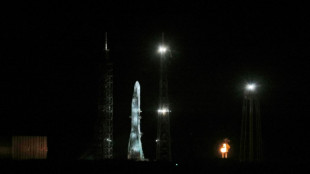
-
 North Korea fires short-range ballistic missiles into sea
North Korea fires short-range ballistic missiles into sea
-
'Not for the poor': Indonesians in capital face housing, commute woes

-
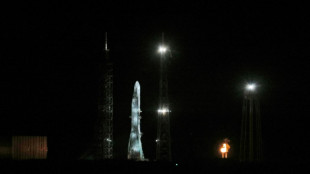 Blue Origin eyes early Tuesday launch but weather an issue
Blue Origin eyes early Tuesday launch but weather an issue
-
Trump's return threatens resurgence of trade wars

-
 Middle East-Based Sigma Capital Unveils $100M Fund to Accelerate Web3 Innovations
Middle East-Based Sigma Capital Unveils $100M Fund to Accelerate Web3 Innovations
-
Grammys still set for February 2, will support LA fire relief

-
 Kazakhstan says part of Aral Sea has nearly doubled in volume
Kazakhstan says part of Aral Sea has nearly doubled in volume
-
US announces new restrictions on AI chip exports

-
 Relative of Jack the Ripper victim demands new inquest
Relative of Jack the Ripper victim demands new inquest
-
PM vows 'pro-growth' rules to make Britain an 'AI superpower'


Private US, Japanese lunar landers launch on single rocket
One rocket, two missions: lunar landers built by US and Japanese companies launched their "rideshare" to the Moon on Wednesday, showcasing the private sector's growing role in space exploration.
On board the SpaceX Falcon 9 rocket that took off from the Kennedy Space Center in Florida were Firefly Aerospace's Blue Ghost and ispace's Resilience from Japan, which will also deploy a micro rover.
Both uncrewed missions aim to build on the success of Texas-based Intuitive Machines, which last year became the first company to successfully touch down on Earth's celestial neighbor.
Until recently, soft landings on the Moon were achieved only by a handful of well-funded national space agencies, starting with the Soviet Union in 1966.
Now, however, several emerging US companies are attempting to replicate this feat under NASA's experimental Commercial Lunar Payload Services program, designed to cut costs and stimulate a lunar economy.
The US plans to establish a sustained human presence on the Moon later this decade under the Artemis program, leveraging commercial partners to deliver critical hardware at a fraction of the cost of government-led missions.
"Each milestone we complete will provide valuable data for future missions and ultimately keep the United States and our international partners at the forefront of space exploration," Firefly Aerospace CEO Jason Kim said Tuesday.
"Firefly is a go for launch. Let's go ghost riders in the sky!"
- Staying upright -
On the Japanese side, Tokyo-based ispace's first attempt to land on the Moon ended in an unsalvageable "hard landing" in April 2023.
"It's important to challenge ourselves again, after enduring failure and learning from it," ispace founder and CEO Takeshi Hakamada said last week.
"Today, we're going back to the Moon," a post on the ispace X account said Wednesday, adding in a promotional video: "Today, we prove our resilience".
Blue Ghost is stacked atop Resilience inside the Falcon 9, SpaceX executive Julianna Scheiman said, and will be deployed first, followed by Resilience nearly 30 minutes later.
The two spacecraft have different timelines for reaching the Moon.
Blue Ghost aims to complete its journey in 45 days, gradually lifting its orbit around Earth before entering lunar orbit and touching down near Mons Latreille, a volcanic feature in Mare Crisium on the Moon's northeast near side.
"With 10 NASA instruments on this flight, we're conducting scientific investigations... from characterizing Earth's magnetosphere to understanding lunar dust and the Moon's interior structure and thermal properties," NASA scientist Maria Banks said.
Blue Ghost also carries technology demonstrations focused on navigation and computing in the Moon's harsh radiation environment.
- 'Moonhouse' art -
Meanwhile, Resilience will take four to five months to reach its destination in Mare Frigoris, on the Moon's far north.
Its payloads include scientific instruments, but the centerpiece is Tenacious, a micro rover developed by ispace-Europe, a Luxembourg-based subsidiary.
The four-wheeled robot features a high-definition camera and will attempt to scoop up regolith -- the Moon's loose surface material.
It also carries on its front a small red "Moonhouse" created by Swedish artist Mikael Genberg.
These ambitious goals hinge on achieving a successful soft landing -- a task fraught with challenges.
Spacecraft must navigate treacherous boulders and craters and, in the absence of an atmosphere to support parachutes, rely entirely on thrusters for a controlled descent.
A final hurdle, as recent missions have shown, is remaining upright.
When Intuitive Machines' Odysseus landed in April 2024, it tipped over, limiting the investigations it could perform.
Similarly, Japan's SLIM lander, which touched down in March 2024, landed at a wonky angle, leaving its solar panels poorly positioned, similarly curtailing its operational lifespan.
P.Petrenko--CPN
